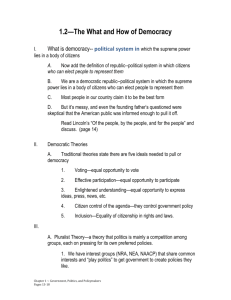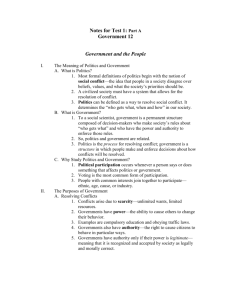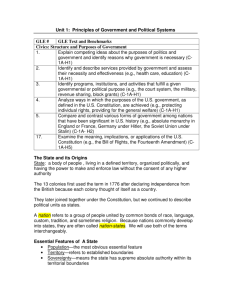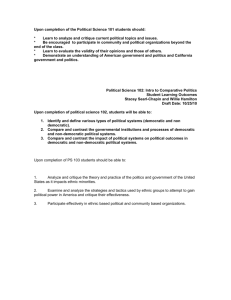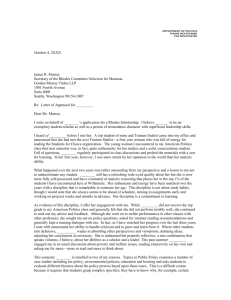Tocqueville's Wish Dream Fulfilled
advertisement
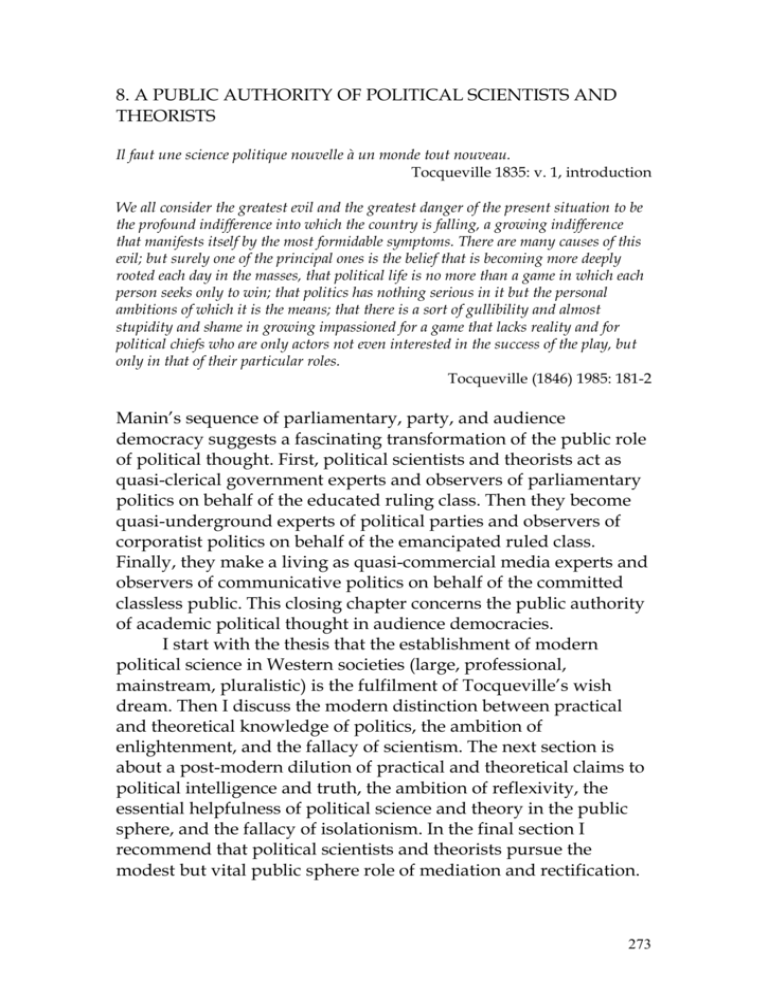
8. A PUBLIC AUTHORITY OF POLITICAL SCIENTISTS AND THEORISTS Il faut une science politique nouvelle à un monde tout nouveau. Tocqueville 1835: v. 1, introduction We all consider the greatest evil and the greatest danger of the present situation to be the profound indifference into which the country is falling, a growing indifference that manifests itself by the most formidable symptoms. There are many causes of this evil; but surely one of the principal ones is the belief that is becoming more deeply rooted each day in the masses, that political life is no more than a game in which each person seeks only to win; that politics has nothing serious in it but the personal ambitions of which it is the means; that there is a sort of gullibility and almost stupidity and shame in growing impassioned for a game that lacks reality and for political chiefs who are only actors not even interested in the success of the play, but only in that of their particular roles. Tocqueville (1846) 1985: 181-2 Manin’s sequence of parliamentary, party, and audience democracy suggests a fascinating transformation of the public role of political thought. First, political scientists and theorists act as quasi-clerical government experts and observers of parliamentary politics on behalf of the educated ruling class. Then they become quasi-underground experts of political parties and observers of corporatist politics on behalf of the emancipated ruled class. Finally, they make a living as quasi-commercial media experts and observers of communicative politics on behalf of the committed classless public. This closing chapter concerns the public authority of academic political thought in audience democracies. I start with the thesis that the establishment of modern political science in Western societies (large, professional, mainstream, pluralistic) is the fulfilment of Tocqueville’s wish dream. Then I discuss the modern distinction between practical and theoretical knowledge of politics, the ambition of enlightenment, and the fallacy of scientism. The next section is about a post-modern dilution of practical and theoretical claims to political intelligence and truth, the ambition of reflexivity, the essential helpfulness of political science and theory in the public sphere, and the fallacy of isolationism. In the final section I recommend that political scientists and theorists pursue the modest but vital public sphere role of mediation and rectification. 273 Tocqueville’s Wish Dream Fulfilled In the very introduction of De la démocratie en Amerique (1835), a cry is heard from the author’s heart: “A new science of politics is needed for a new world”. The American, Dutch, and French revolutions shaped a fundamental change in politics. The people entered the world stage and world history. The idea of popular representation was invented and tried in many colours and shades. Henceforth, the struggle within and across national states would determine the order of modern societies. For all these reasons, Tocqueville held the view that a science of politics – not a history or ethics of politics – was needed to interpret the democratic experience with novel concepts, methods, connections, and prescriptions. Tocqueville had a troublesome career in French politics after his journey to North America as member of the Chamber of Deputies, Minister of Foreign Affairs. He saw political science as one remedy against the modern disease of civil disengagement, a corrupting silence of winners and losers alike, hidden from view by showmanship and stage rebellion in parliament and government.1 Tocqueville was overstating. Democratic nationalism implies representative democracy embedded in a constitutional framework and an open national economy, with guarantees of justice by a central government and diversity of (partly contradictory) civil values and life forms. The democratic national state is special, but not unique. Similarities or overlaps with other political regimes – the tribe, city, church, kingdom, empire, or union of federal states – may still matter. But Tocqueville’s point was well taken. For centuries, political thinkers had stated that democracy perishes from its own mistakes, degenerates into rule of the mob, and is part of a cosmic cycle of emerging, sustaining, and collapsing regimes: rule by the one, by the few, by all, and then again back to rule by the one, and so on. Tocqueville’s special intuition gave birth to the general problem of modern political science and philosophy. Is democratic society – with a distinctive political system and public sphere – desirable and sustainable? It did not take long for the new science to enter the intellectual and academic scene (see Blokland 2006). From 1850 till World War I, it soared high under the guidance of such figures as 274 Bagehot, Bernstein, Dicey, Le Bon, Marx, Michels, John Stuart Mill, Mosca, Ostrogorski, Pareto, Spencer, and Wilson, the future American president. They examined the circulation of elites, the estates and classes of mass society, party struggle, the public sphere (press, protest, intelligentsia), the growth of government, ideologies of collectivism, and colonisation by great powers. Their controversy was a clash between those who saw democratisation as progress, and those who saw it as decline of civilization (cf. Bernstein 1899 with Michels 1911). In the Interbellum, the research agenda shifted to the crisis of parliamentarism, liberalism, the rise of European totalitarianism, and American activism.2 Bryce, Dewey, Laski, Lasswell, Lippmann, Ortega Y Gasset, Schmitt, Spengler, and Weber were towering figures here. This stage of development of modern political science included the great planning debate during World War II, with contributions such as Mannheim’s Man and Society in an Age of Reconstruction (1940), Schumpeter’s Capitalism, Socialism, and Democracy (1942), Polanyi’s The Great Transformation (1944), and Hayek’s The Road to Serfdom (1944). It is no coincidence that refugees – and ex-communists like Koestler and De Kadt – stimulated agreement about democratic order after the defeat of Hitler’s Germany, including new ideas about regulation of media monopolies and government public relations. This was a springboard era for empirical research methods (such as electoral research and public opinion research), foundational theories, academic specialisation, and a discourse separated from jurisprudence, economics, and other social sciences. Controversy remained with a clash between those who believed in the compatibility of representative democracy and large scale modernisation, and those who foresaw the rule of political parties in a new dictatorship (plebiscitory democracy, people’s democracy) (cf. Lipmann 1925 with Dewey 1927). Since 1945, the new science gained momentum under American leadership and linked to swelling numbers of students, teachers, and occupational prospects. Robert Putnam (2005: 314-5) rightly notes that political thought in the past sixty years has been driven by a small set of questions which was fully linked to the dark past of falling, failing, and fanatic party democracies. Why Verdun? Why Hitler? How to make international politics after 275 Hiroshima and Nagasaki? How to democratise new states after the fall of European colonialism? Tocqueville’s contemporary academic community is large, professional, mainstream, and pluralistic. It is large in the sense that it comprises thousands of faculty and trained civil servants, teachers, journalists, activists, and consultants, often working far beyond the traditional core area of electoral systems, foreign policy, and local administration. It is professional in that there are official curricula, textbooks, methods, and certificates; associations for calibration of standards, disciplinary arrangements, community feelings and protected interests; and boundary disputes with other social sciences. It is mainstream in that political science is respected as a university department, national civil education, and subsystem for the maintenance of liberal democracy. The University of Amsterdam legitimated the creation of a Department of Political Science in the years 1945-1948 by referring to a never-again attitude concerning appeasement and naivety in the national response to the rise of Hitler. Generally, and under the influence of Europeanisation of American social sciences (the brain drain of Adorno, Lazarsfeld, and many others) and post-war Americanisation (or proud and jaunty anti-Americanism, as in France), political scientists and theorists see themselves as defenders of democratic society. Their books, articles, edited volumes, and conference papers are distinctive expressions of democratic commitment and contributions to safeguarding and invigorating democratic life, on a par with their academic teaching, public policy consulting, and participation in news media debates. While they study pre- and non-democratic regimes and pay attention to features of all political regimes, democratic or otherwise, their whole body of accumulated knowledge is presented as an integral part of the capital of democratic societies. Without real, scientific knowledge about politics politicians, journalists and citizens cannot arrange the survival, stability and flourishing of liberal democracy, hence, their current concern with the phenomenon of joyless politics (distrust and disengagement; see Munck and Snyder 2007 and my Introduction and chapter 3).3 John Rawls, a leading theorist of justice since 1989 and 2001, mentions several public roles of political theory: discovery of agreement on deeply disputed and divisive issues among citizens 276 and their representatives; orientation as to the meaning of society and its culture, institutional framework, and history; reconciliation with the obligations and limits of democratic society; and construction of realistic utopias, that is, the study of social improvement by political means within the boundaries of human nature. This appears to be an eloquent expression of the democratic self-image of even the most technical and aloof student of politics today. While most Western political scientists and theorists have abandoned Plato’s concept of guardianship, they do see themselves as keepers of the spirit and promise of liberal democracy.4 Finally, Tocqueville’s brainchild is endowed with pluralism. The variety of scholars in current academic political science is known, as is their love of distinction and diversity. Mainstream economists take the neoclassical theory of strategic action by firms and families under the circumstance of relative scarcity for granted; mainstream political scientists and theorists disagree about the very existence of a foundation of the political experience. Comparative scholars sit beside regional specialists; practical political philosophers mingle with experts in the history of political ideas, theorists of international relations, proponents of integrated public policy sciences, and practitioners of fundamental research and methodology. Many of these scholars move in different directions. There is empiricism (or behaviourism, as political scientists call it); functionalism (or systems theory, or evolutionary approach); rationalism; institutionalism; constructivism (the new term for phenomenology and the interpretative approach); critical theory (successor to historical materialism); and, of course, positivism and its postmodernism counterpart. There are also style differences that crosscut the differences in specialisation and schooling. The natural scientist engages in discovery of universal laws of politics, preferably in constant numbers. The formalist, alias theorist, catches the logic of politics in formulas and proofs. The roundabout thinker highlights one aspect of society and derives politics from that single aspect (the political economist, geographer, psychologist, and so on). The traveller, alias interpreter, uncovers the locality and contextual nature of political spaces and practices. And the activist uses political science as a device for political morality, public policy, 277 and social improvement. Among my colleagues, I also find empire builders, researchers, teachers, journalists, and double talents who combine academic life with a career in party politics or public policy making.5 The Modern Distinction between Practical and Theoretical Knowledge about Politics Nevertheless, most political scientists and theorists are united in their celebration of a distinction between practical and theoretical knowledge of politics - on a par with separation between state and academia in the free world. Indeed, it is the noble task of political scientists and theorists to enlighten mankind – the public of publics – by voicing, filtering, systematising, and funding practical knowledge in a great canon from Aristotle and Montesquieu to Weber and Lasswell. Practical knowledge is any set of beliefs and statements that emanates from daily experience of politics, as well as ongoing reflection on daily experience within and across broad groups of politicians and based on senses and conventions. Practical knowledge grows without scientific pretension and comes from visceral experience of victory and defeat and learning of such experience from others, be they heroes of the distant past or colleagues in the field. Theoretical knowledge is any set of beliefs and statements that emanates from open, rational, replicable, and revisable procedures of inference within and across groups of trained scholars. It grows at a critical distance from politics, whether high politics (academics in the company of insiders) or low politics (academics in the company of outsiders). Such knowledge - also referred to as objectivity, critical consciousness, or erudition - comes from rigorous scrutiny of the author’s claims to truth. Academics are outnumbering and outmanoeuvring the selftaught practitioners of political ideas and practices. There were more self-taught intellectuals and leaders in the era of party democracy than in the current era of audience democracy. Perhaps for this reason, academics pose as generous owners of theoretical knowledge. They bring to the study of politics a disdain for uncomplicated and anti-intellectual politicians (hence, their embarrassment with the professionalisation of political acting 278 talent by Reagan, Berlusconi, and their epigones). Yet they invite serious politicians and citizens to a universe of political hypotheses and ideas beyond (auto-) biography, diary, narrative, minutes, official history (of nations, state organs, and parties), stage-plays, novels, poems, movies, reports, and archives. They argue that “practical men, who believe themselves to be quite exempt from any intellectual influences” (Keynes 1974: 383) are better off by learning and applying the results of empirical and philosophical studies of politics. Political studies in contemporary academia are marked by strong identification with the methodology of the social sciences (rigour) and the future of liberal democracies (relevance).6 A feeling for method and argument and their difficulties and limits in the political world is what makes political scientists and theorists so different from other honourable academics and nonfiction writers. It is their weapon against current delusion, illusion, bullshit, self-deceit, prejudice, fallacy, after-dinner talk, closed thinking, demagoguery, hypocrisy, opportunism, excessive abstraction and idealisation, narrow-minded specialism, partisanship, political correctness, ethnocentrism, and other pathologies of democratic societies based on free communities of science and thought.7 The interplay between practical and theoretical knowledge allows for various case sets. Two confirm the self-image of modern political science and theory. One (scientism) seduces academics to fall back on anti-democratic habits in the spirit of Plato, rather than Tocqueville. The pure case for enlightenment: joint growth of political knowledge and academic knowledge for abolition and control of human costs and losses rooted in ignorance, clumsiness, and special failures of the mind: impulsive behaviour (passion out of ignorance), ideology (interest out of ignorance) and dogmatism (principle out of ignorance). The impure case for enlightenment: correction of political knowledge by academic knowledge, that is, reducing the danger of populism by approaching recurrent problems and tensions “out of the box” and “against the flow” (Brittan 2005). The case of the limits of enlightenment, based on self-command by experts: correction of academic knowledge by political 279 knowledge of political and apolitical strata of the population, that is, reduction of the danger of scientism. Some post-war illustrations of the case of pure enlightenment are incremental decision making (the public policy models of Simon and Lindblom), the signalling of power differences (methods of local power research in elitism and pluralism), power sharing in divided societies (the designs of Lijphart and Horowitz), and competent administration of civic communities based on social capital and governance of commonpool resources (the projects of Putnam and Ostrom). Illustrations in political theory include Popper’s plea for piecemeal social engineering, Berlin’s restatement of value pluralism, and Hayek’s and Oakeshott’s restatement of the rule of law.8 The case of corrective political science and theory belongs to Montesquieu’s and Madison’s checks and balances (structurally moderate government), Smith’s free trade (the invisible hand), and Keynes’s counter-cyclical fiscal policy. Recent examples of mechanisms in political science are Olson’s free-rider behaviour, Elster’s precommitment by independent public agencies, Snyder’s violence and war in incomplete democratic regimes, Sen’s dissidence-based detection of economic misery, and Sunstein’s conformity-based polarisation and extremism. Examples in political theory are Easton’s reduction of overload in democratic systems, Rawls’s veil of ignorance (protection of the vulnerable in the public interest), and MacIntyre’s and Charles Taylor’s restatement of virtues of authorities. The least flattering and most dialectical indicator of success of political science and political theory is the case of selfrestraining enlightenment. This concerns settings in which political experts give up excessive rationalism and learn from pragmatic upper layers or wise crowds. In The Counter-revolution of Science (1952), Hayek tracked the modern phenomenon of scientism. Scientism is a method of politics and public policy that is based solely on scientific sources, proofs, and recommendations when theoretical knowledge is drastically limited and nearly impossible to access (ignorance in hierarchical systems, complexity, innovation, tragic choices, crises, or basic imbalances) (Hayek (1952) 1979). The familiar example of retreat of scientism concerns the libertarian and conservative critique of the cradle-to-grave welfare state in the 1970s and 1980s (excessive taxation and 280 regulation, stagflation, subsidy of expensive private taste), combined with contractarian, egalitarian, and republican objections against “government house utilitarianism” (Williams). Political scientists and theorists had gone too far in their unduly intellectual support of expanding social policy programs and the role of state intervention in the pursuit of happiness (ibidem 1985: 108-10). Recent and sometimes disputed examples of scientism in political science and theory include democratic neo-liberalism (market competition within the public domain), democratic multiculturalism (group rights in the public sphere), and democratic imperialism (imposition of democracy). The last example is particularly telling. Since 1945, a consensus had emerged that the export of Western models of democracy by force was impracticable and unthinkable. Such pragmatic consensus was influenced by European decolonisation, American aversion to colonialism, the terms of containment between the American and Russian alliances in the Cold War, modernization (and a bit of civilization) theory, and the idea of national selfliberation (a bastard of conquest and levelling-up theory). The exceptionally salutary occupations of Germany, Japan, and Austria plus the American backing of Christian Democracy in post-fascist Italy were by-products of legitimate and effective war efforts.9 Both the ambivalent record of American interventions in the Middle East (Iran), Asia (Korea, Vietnam) and South America (Chile) and the wave of peaceful transitions towards democracy in Southern Europe and, later, South America, South Africa and the heart of Europe seemed to underline a triple lesson. It was prudent to promote democracy abroad by means of soft power within the legal framework of the United Nations: preparation of timely elections as the final phase of peace-keeping. It was also prudent to legitimate military interventions and covert operations in the national and Western interests of stability, rather than to return to imperialist discourse. And it made sense to follow the general sequence of national identification, institutionalisation of the state and legality, and, eventually, formation of mass electorates and moderate parties (Huntington 1968). The war in Iraq since 2003 breaks with such chastened enlightenment in international relations. (I will not discuss the case of excessive enlargement of the European Union since 1993.) This 281 war indicates a brief period of scientism in the foreign policy of the United States, the United Kingdom, and their allies. According to radical conservatives and liberals, military intervention may be justified not only in cases of self-defence, regional instability, and gross violations of human rights, but also in cases of democratic nation-building in stagnant authoritarian regimes and so-called failing states with strategic location for the West. The failure of the experiment of forced constitutionalism and con-sociationalism in Iraq seems to confirm a fallacy of an influential minority of political scientists and theorists, and the sound judgment of many leaders of government and demonstrators in the West who were consistently hostile and sceptical in the matter of the theoretical doctrine of regime change (Cushman 2003, Daalder & Lindsay 2003, Feldman 2003, Frum & Perle 2003, Fukuyama 2003, 2006, Sharansky 2004, Diamond 2005). Post-modern Overlapping of Practical and Theoretical Knowledge in Audience Democracy The primary feature of audience democracy from the point of view of social and political theory of science is the overlapping of practical and theoretical knowledge of politics. Many political parties, parliaments, governments, and public sphere voluntary associations and news media, as well as a growing number of members of the political stratum of citizens, know, understand and use topical insights of political thought, or think they do. An important example is the Kantian theory of democratic peace and its popularisation and application by Wilsonian presidents, such as Carter, Clinton, and Bush Junior (Mead 2001: 132-173, Mansfield & Snyder 2001: 1-3). The public influence and authority of political science and theory in audience democracy are both outcome and condition of some related trends. First, modern representative politics has rationalised itself by hiring advertising agencies, professional campaigners, pollsters, public opinion analysts, trend watchers, public relations officers, specialised policy consultants, reporters, editors, and so on. Most of them have had at least minimal training in political science or new-fashioned social sciences (management communication science). 282 Academic political science and theory faces lower costs of access to politics owing to its alumni’s omnipresence in political staff roles. Such alumni are used to academic language and reasoning, although they still face contempt and resistance by nonacademic politicians and their assistants.10 But academic political science and theory can only get the attention of the bastions of government and private power via accessible writing (lecturing, debating, and so on), translation of academic language into lingua franca, and intermediation by professionals in the political theatre itself. Political hypotheses and ideas are only taken seriously if they are modified into policy memoranda and media messages. On the left, the difficult analytical work on liberal egalitarianism (Dworkin, Rawls, Sen, among others) was simplified, operationalised, and turned into slogans by Third Way intellectuals such as Giddens and Mulgan in the United Kingdom, and Galston, an academic political theorist and active Democratic Party member, in the United States (Mulgan 1994, 1997, 2006, Cuperus, Duffek, & Kandel 2001, Schmidt et al. 2005). Some political theorists (Barber, Dworkin) tolerate bits of cosmetic concepts of equality (slogans, sound bites) as adjustment to audience democracy, the new and noisy habitat for practical philosophers. Others (Barry) detest the Third Way as pseudo philosophy and false egalitarianism (Dworkin 2000: 1, 7, Barber 2001: 309, Barry 2005). The right seems less worried and less scrupulous here. It accepted the necessity of synthesis of science, philosophy, personal image building of thinkers, and street talk long ago. As Micklethwait and Woolbridge (2004: 73; cf. Steinfels 1979) put it: Crucially, the neocons spoke the language of social science. Conservatives had long insisted that government programs weakened the natural bonds of society, without ever being able to prove it. The neocons showed that social problems were much harder to understand than they appeared – and that social engineering of the Great Society sort was plagued by perverse consequences. Welfare payments can reinforce dependency. Preferential treatment may harm its supposed beneficiaries by shielding them from competition. Overzealous egalitarianism can undermine educational institutions such as New York’s City College and reduce social mobility. The neocons were muckrakers of the Right, discrediting government just as the original muckrakers had discredited the robber barrons. The neocons also dwelled on the importance of informal institutions that other social scientists ignored. In 1965, a young official in 283 the Department of Labor, Daniel Patrick Moynihan, caused a sensation with a paper – immediately dubbed the Moynihan Report, though his name did not appear on the original document – that suggested that the problems of the urban black poor stemmed, in large measure, from the collapse of the black family. Other neocons showed that a society’s “little platoons” – its voluntary institutions- are much more vital to its health than ambitious government programs. And they warned that disorder was a much bigger threat to social well-being than permissive liberals might imagine. In other words, they dressed traditional conservative insights in the language of social science. The second trend is the rise of integrated media sciences and media-based popularisation of scientific considerations and results, both legitimated by the sacred notion of the sovereign public (audience orientation, putting citizenship first). Political science is becoming a pillar of integrated media sciences, while certain outstanding researchers and philosophers are coveted discussants and commentators in eminent or popular media outlets. On one hand, essential questions of (Tocquevillean) political science on power, authority, loyalty, public goods, public burdens, distributive justice, and the mixture of representation and participation in democratic society will enter into news media, political organizations, and households under the condition of popularisation. A sufficient number of academics is supposed to be able and willing to communicate and visualise the answers to such questions and link them to daily and practical concerns of the public (both spiritual and material, personal and shared). On the other hand, media markets of political science and theory are imperfect. Media that use political experts do not assess their methods. Political experts do not see the need for a professional code or independent authority. Soft news media and dubious experts collude. Philip Tetlock (2005: 229-38) uncovered a negative relation between media contacts and the quality of political predictions by pundits. News media, corporations, public agencies and advocacy institutes hire experts to be brief, simple and robust in their statements. They prefer “hedgehogs”, that is, political experts who know one big thing, apply this insight aggressively over as many domains of human agency as possible, have no patience with those who do not get it, and see the natural sciences as the role model for social sciences. It turns out, however, that “foxes” predict major political events and changes better than 284 hedgehogs. They know many small things, distrust great systems of thought, and are flexible and synthetic in their reasoning. The predictive ability is related to prudent calculation of probabilities, acceptance of complexity and surprises, the will to revise false views, and openness in absorption of deviant historical information. Foxes are better at developing this core ability, while hedgehogs have larger media market shares. The third and final trend is a steady but intangible impact of political science and theory on the discourse of news media and the public, in particular the quality press and the political stratum. Many journalists and interested citizens use fashionable technical terms and basic concepts imprecisely and without a sense of the limits of jargon. Think of fascism, balance of power, non-decisions, rational man (the calculating individual), the Prisoners’ Dilemma (free-riders), the End of History, neo-liberalism, or framing. Framing – a concept in cognitive psychology, social movements research, communication science, and ubiquitous in electoral research – is imitated by media producers, consumers, and political party and ministry consultants. This is not the venue for empirical studies about political scientists’ and theorists’ influence and authority in various national polities, absolutely and relative to other disciplines and other moments of democratic ordeal like the Republic of Weimar (1919-1933). My speculation is that the influence of this academic discipline on the political behaviour of politicians, journalists, and citizens is soft, and its authority is weak. External influence is soft because political agents in the real world often have good reasons to neglect learned periodicals (American Political Science Review, European Journal of Political Research) without jeopardising their power and money. Likewise, they may let pass the latest calls for new theories of old phenomena (government, violence, and so on) and the latest fashions in the self-assured discipline (group interests, issues of solidarity and power analysis in the old literature, and group identities, issues of trust and discourse analysis in the new literature).11 Such neglect is reinforced by cognitive weaknesses of political agents, like their neglect of the future.12 External authority is weak, as in the case of realists in foreign policy.13 Several factors have been conducive to the end of the vanguard of political thinkers. On the demand side: routinisation 285 of liberal democracy with a steady diet of “canvassing, persuasion, exchange of services, rewards and benefits, alliances and deals” (Finley on natural politics); routinisation of publicly- and commercially-funded policy research, with roughly equal prospects of good and bad policy advice; individualisation of society (disappearance of broad organizations based on crosssections and cleavages); and the rise of economism, legalism, and moralism in politics.14 On the supply side: recognition of the secondary role of political experts in a mature democracy based on self-respect and self-reflection among citizens and their autonomous representatives (in particular the elected ones); proletarisation of academic life (introduction of commercial methods of organization and management, strong pressure on teaching and publishing, low remuneration and social esteem for academic non-stars who make up the majority); globalisation (growing lack of research interest in purely local politics); and political correctness and conformism (yesterday’s lack of analysis of the costs of liberalism, such as cosmopolitanism; today’s lack of analysis of the costs of conservatism, such as imperialism).15 In the most pessimist perspective on the public political sphere in Western societies today, most makers, users, and objects of political news concur with the irrelevance of academic political science and theory. Political scientists and theorists to date try to come to terms with their public degradation in audience democracy relative to their privileged position in party democracy. One response is fundamental study of the problem of regressive reflexivity: the behaviour of political agents is influenced by insights of academic observers; academic observers try to model such influence; political agents take such sophisticated models into account, and so on. Public reputation, in particular role expectations about what politicians, journalists, citizens, and experts are supposed to know about each other and communicate to each other, seems crucial.16 Another, more dubious response is the fallacy of isolationism. Some political scientists and theorists are fed up with what they perceive as the messy, shallow, or dirty practices of popular representation and participation via political television and online politics. They withdraw into their universities, research schools, associations, and networks. There they try to continue their critique as if audience democracy does not matter, either by 286 relying on older models of liberal democracy or by leaving politics altogether out of their models of new society, such as the turn to (meta-) ethics.17 Some turn to academic politics, overrate their own standing in democratic politics, and think of the war between academic subcultures as the real (albeit second-best) thing, such as liberal nationalists versus liberal cosmopolitans; European intergovernmentalists versus European federalists; competitive versus deliberative democrats. Doorkeepers in the Playhouses of Audience Democracy There must be a third response that puts into practice theoretical notions about interplay between, on the one hand, political scientists and theorists and other experts in academia and, on the other hand, politicians, journalists and citizens in a “self-reflective” audience democracy (Fishkin 1992). Political scientists and theorists ought to strike a balance between proximity (mediation) and distance (rectification) in their public role. Like journalists, practitioners of contemporary history, and think-tank policy researchers, they should actively engage with politicians and public officials in a broad sense. They should meet them, talk with them, and shape well-informed opinions about daily practices of representation and participation under the present circumstances of politics and law. Specifically, political scientists and theorists should observe the strategic interaction between politicians/parties and journalists/media by standing close by. Generally, they ought to keep in touch with all agents in the triangle of audience democracy: politicians and their parties, organizations, and movements; journalists and their media outlets; citizens and their associations. The trend of globalisation and diminution of ever more fragmented communities of ever more specialised experts of politics needs to be stopped because it undermines the public influence and authority of political scientists and theorists in polities nationally and internationally. Furthermore, political scientists and theorists (method- and theory-pushed as they are, and rightly so) ought to focus on the general system and equilibrium (if any) of politics in audience democracy. It goes without saying that they are forbidden to serve the sectional interests of classes of politicians, journalists and citizens. But neutrality does not imply a focus on the interests of 287 the public as the primary pull factor of public performance by political experts. Such a focus will merely reinforce the professional focus of politicians on voters and a similar focus of journalists on subscribers (audience orientation). It also leads to canonisation of ordinary people and citizens (‘the voter has spoken, the voter is right’). Instead, the public political scientist or theorist should address the interests and concerns of connoisseurs in the audience, in journalism (fellow reviewers of the political theatre), and in professional politics. There are, always and everywhere, political sub-strata who are quality-conscious and permanently concerned with the stability and future of liberal democracy as a whole and as a way of life. Political scientists and theorists to date have trained young people in order to let them join the ranks of the universal democratic elite. They stopped training other young people and adult laypersons out of fear of paternalism or loss of academic tenure. I suggest that audience democracy needs political scientists and theorists who continue such training, in the sense that they join the hard business of public rectification of fallacies, misunderstandings, obsolete conflicts and cases of human evil in the political process and the actions of government. To paraphrase Marx, political scientists and theorists have only interpreted the world of political communication in various ways; the point is to help all human beings who are involved in the high quality and practical improvement of political communication. 288 Notes Chapter Eight 1 Jardin 1988, Wolin 2001; cf. the Tocquevillean anatomy of post-communist Russia in Anderson 2007: 3-12. 2 See on the similarities between Hitler’s maiden speech to the Reichstag and Roosevelt’s inaugural lecture in March 1933 Ferguson 2006: 221-7, 243. 3 See e.g. Joseph Rowntree Charitable and Reform Trust 2006. See for a survey of all national committees on political disengagement and reform Ministerie van Binnenlandse Zaken 2006. 4 Rawls 2001: 1-5. See for an older European declaration Crick (1962) 1992. 5 Almond 1990, van Deth 1993, Goodin & Pettit 1993, Goodin & Klingemann 1996, O’Sullivan 2000, Katznelson & Milner 2002, Kymlicka 2002, Marsh & Stoker 2002. Variety breeds volume. Oxford University Press publishes no fewer than eleven handbooks of contemporary political science including Dryzek, Honig, & Phillips 2006, Goodin & Tilly 2006. 6 See Ricci 1984. Debates on the balance between rigour and relevance are recurrent, as during the rise of behaviourism in the 1940s, Marxism in the 1960s, institutionalism in the 1980s, and humanism in the present decade. See Kasza 2001: 597-9, APSA Task Force 2004: 651-66. 7 See most recently King, Keohane, & Verba 1994, Davis 2005; George & Bennett 2005. For the best illustrations of enlightenment in comparative and international political studies George & Bennett 2005. 8 Putnam 2003: 249-256. See for a survey of progress in power studies Lukes 2004. 9 See e.g. on the Japanese occupation Dower 1999. 10 See on the gap between the common views of politics of members of American Congress and American political scientists Edwards 2003: 349-43. 11 See e.g. Levi’s “Why We Need a New Theory of Government” (2006: 5-20). The “we” in the title is not a national or international community of democrats, but an academic community of rational-choice institutionalists. 12 Pigou (1929: 25) called this the defective telescopic faculty of humans. Thaler (1992: 63-78) calls this the status quo bias. 13 Even funding agencies show disdain for academic students of politics. See Lupia 2000: 7-13. 14 Finley 1984: 51. See on the depoliticisation in economism Siedentop 2000, in legalism Shklar (1964) 1986, in moralism Ankersmit 1997. 15 See on resentment in the human and social sciences due to proletarisation Grayling YYYY: “They feel themselves, simultaneously, greatly superior and vastly undervalued, above their countrymen yet isolated from them and insufficiently rewarded and revered by them. They have about them a perpetually disappointed air: one senses they feel the world has let them down. Sometimes this will reveal itself in general sourness; sometimes it takes the form of hopelessly radical political views.” 16 One of the most promising programmes in political theory concerns the intangible hand of reputation, rather than the iron hand of legal coercion or the invisible hand of competition in Pettit 1996: 284-355, 1997, 2001, Brennan & Pettit 2004. 17 The best recent works on party systems does not deal with media systems: Panebianco 1988, Kitschelt 1994, 1996, Mair 1997. The best textbook on contemporary political theory does not discuss social and political ideologies and doctrines in the historical political world but ethical models of good society and politics in the academic world (starting with utilitarianism). The sections on practical politics are the shortest: Kymlicka 2002. 289


